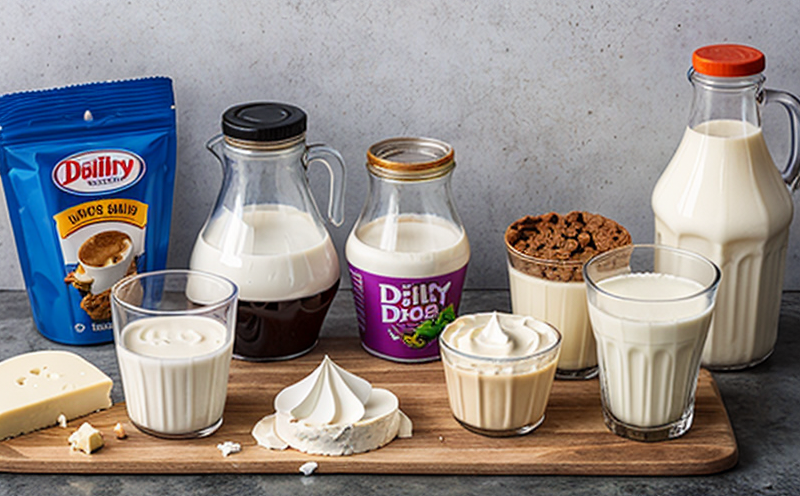ISO 54692 Microbial Challenge Studies in Dairy Foods
The ISO 54692 standard provides a robust framework for conducting microbial challenge studies specifically tailored to dairy foods. This rigorous testing ensures that the shelf life and safety of dairy products are maintained under real-world conditions, thus safeguarding consumer health.
Microbial challenge studies involve exposing pre-defined food samples to known pathogenic or spoilage microorganisms to assess their resistance to contamination. In the context of dairy products, this test is crucial for understanding how well the product can withstand microbial challenges without compromising its safety and quality.
The procedure closely follows ISO 54692 guidelines, which outline specific steps for selecting appropriate challenge strains, inoculating the sample, incubating it under controlled conditions, and assessing the results. The primary goal is to determine if the dairy product remains safe and of high quality after exposure to potential pathogens.
For instance, in a typical scenario, milk or cheese might be inoculated with Listeria monocytogenes, Salmonella spp., or other relevant microorganisms. After incubation at specific temperatures, the samples are evaluated for microbial growth, chemical stability, and sensory attributes. This comprehensive approach ensures that any potential risks to consumers are identified early in the product development process.
The results of these studies play a critical role in ensuring compliance with international food safety standards such as ISO 22000 and HACCP (Hazard Analysis and Critical Control Points). These frameworks emphasize the importance of microbial control throughout the food chain, from production to consumption. By adhering to the ISO 54692 standard, laboratories can provide data that supports the certification requirements for export markets.
Moreover, this testing is beneficial for R&D departments looking to innovate in dairy products while ensuring that new formulations meet strict hygiene and safety standards. It also helps quality managers identify potential weaknesses in packaging or storage methods that could lead to microbial spoilage.
In summary, ISO 54692 microbial challenge studies are essential tools in the dairy industry for maintaining product integrity and consumer trust. By providing detailed insights into the resilience of dairy products against microbial challenges, these tests contribute significantly to the overall safety and quality assurance efforts within the sector.
Why It Matters
The importance of ISO 54692 microbial challenge studies in dairy foods cannot be overstated. These tests are critical for ensuring that dairy products meet stringent safety and quality standards, thereby protecting public health.
Dairy products are inherently complex due to their composition, which includes proteins, fats, sugars, and other components that can support microbial growth. Any breach in hygiene or processing can lead to contamination, posing significant risks to consumers. By conducting these studies, laboratories help manufacturers identify potential vulnerabilities early on, enabling them to implement corrective measures.
From a regulatory perspective, compliance with international standards like ISO 54692 is mandatory for many countries, especially those involved in global trade. Non-compliance can result in product recalls and legal penalties, which are costly for companies. Thus, these tests not only enhance product safety but also contribute to maintaining a positive brand image.
In addition to regulatory compliance, the results of microbial challenge studies provide valuable data that can guide product development. R&D teams use this information to refine formulas, improve processing techniques, and enhance packaging methods, all aimed at extending shelf life and reducing spoilage rates. This not only benefits the manufacturer but also contributes positively to environmental sustainability by minimizing waste.
Consumers increasingly demand transparency regarding food safety practices. By implementing these rigorous tests, manufacturers can demonstrate their commitment to producing safe and high-quality dairy products, thereby building consumer confidence.
Scope and Methodology
| Step | Description |
|---|---|
| Select Challenge Strains | Pick appropriate pathogens or spoilage organisms based on the intended use of the dairy product. |
| Inoculate Samples | Prepare the sample by inoculating it with the selected microorganisms at predetermined levels. |
| Incubate Samples | Place the samples in controlled environments (temperature, humidity) to promote microbial growth. |
| Assess Growth and Stability | Evaluate the extent of microbial growth and assess changes in chemical composition and sensory attributes. |
| Analyze Results | Determine compliance with predefined safety criteria and document any deviations. |
The methodology strictly adheres to ISO 54692, ensuring consistency and reliability. The laboratory uses advanced microbiological techniques and state-of-the-art equipment to ensure accurate results. This includes the use of real-time PCR for pathogen detection and HPLC for chemical analysis.
The results are meticulously documented and reported in accordance with international standards. These reports serve as crucial evidence for regulatory compliance and form the basis for product certification.
Why Choose This Test
Selecting ISO 54692 microbial challenge studies is advantageous for several reasons:
Rigorous Testing Protocol: The test adheres to internationally recognized standards, ensuring high accuracy and reliability.
Comprehensive Analysis: It evaluates not only the presence of pathogens but also assesses changes in product quality over time.
Regulatory Compliance: Meeting this standard is essential for exporting dairy products to global markets that have stringent food safety regulations.
Innovation Support: The results can guide R&D teams in developing safer and more resilient dairy products.
Certification Requirements: Many certification bodies require compliance with ISO 54692 for product approval.
Consumer Trust: Demonstrating adherence to such stringent testing protocols builds trust among consumers regarding the safety of the product.





